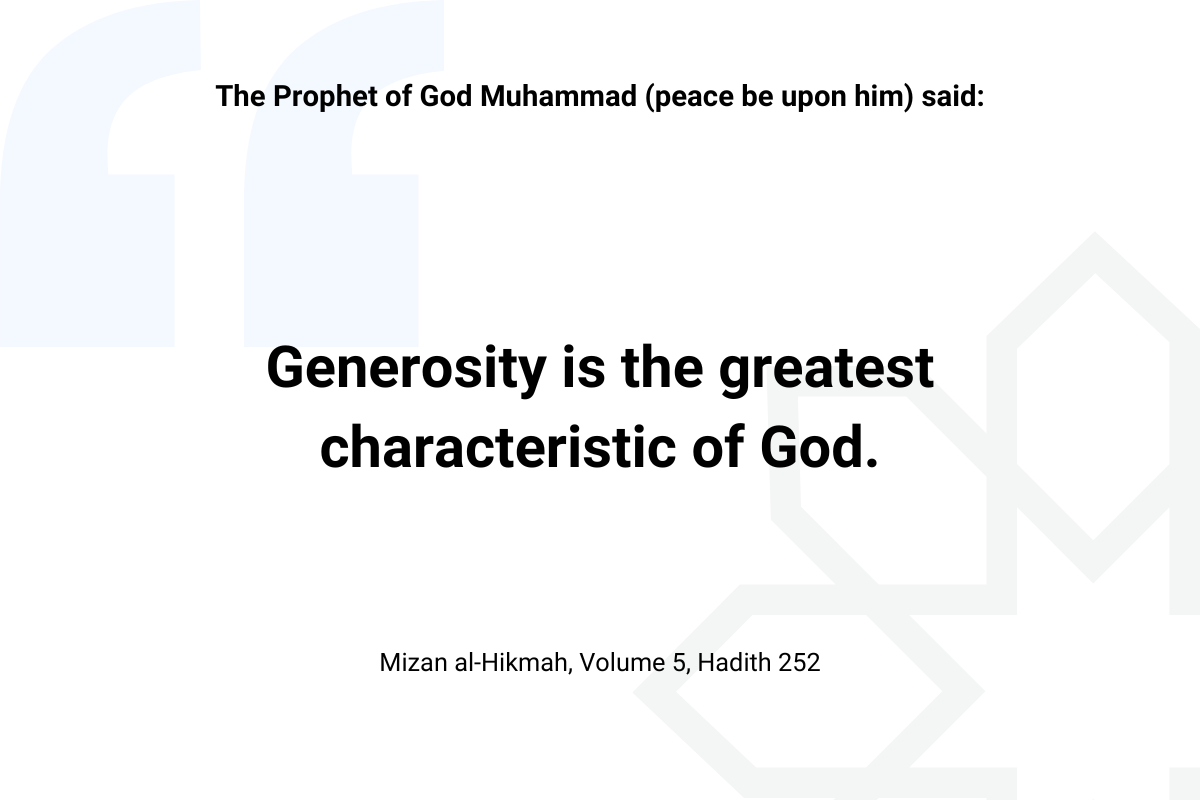The Messenger of God (peace be upon him) said: “Generosity is the greatest characteristic of God.”
Source: Mizan al-Hikmah, Volume 5, Hadith 252
Understanding Generosity in Islam Quote
The Significance of Generosity
In Islam, generosity (sakhā’) is considered one of the most important virtues and is highly emphasized in various teachings and hadiths. The above hadith, where the Prophet Muhammad (peace be upon him) states that “Generosity is the greatest characteristic of God,” underscores the profound value of this trait in the Islamic faith. This statement highlights that by embodying generosity, one mirrors one of the fundamental attributes of Allah, thereby bringing oneself closer to the divine essence.
The Spiritual and Social Benefits of Generosity
Generosity is not only a means of spiritual elevation but also a foundation for building a harmonious society. Studies in social psychology reveal that acts of generosity can enhance one’s sense of well-being and happiness. According to a study published in the “Journal of Happiness Studies,” generous behavior leads to increased life satisfaction and reduced stress (Aknin, et al., 2013). This scientific perspective aligns with the Islamic view that generosity fosters a sense of community and mutual support.
The Prophet’s Guidance on Generosity
Generosity as a Reflection of Faith
The teachings of the Prophet Muhammad (peace be upon him) frequently emphasize the importance of being generous. In another hadith, he said, “The best of people are those who are most beneficial to others” (Sahih Bukhari, Volume 8, Book 73, Hadith 56). This reinforces the notion that generosity is not merely a charitable act but a reflection of one’s faith and commitment to benefiting others.
Practical Ways to Practice Generosity
To integrate the principle of generosity into our daily lives, we can follow several practical steps:
- Charitable Giving: Regularly donate to charities and support those in need. This not only helps the less fortunate but also purifies one’s wealth.
- Time and Effort: Offer your time and effort to assist others. Volunteering and helping neighbors are excellent ways to practice generosity.
- Kindness in Speech and Actions: Generosity is not limited to material wealth. Be generous with kind words, support, and encouragement to those around you.
The Broader Implications of Generosity
Building a Culture of Generosity
A society that values and practices generosity is one that thrives on mutual respect and support. When individuals prioritize giving and helping others, it creates a ripple effect that enhances community bonds and overall societal well-being. This culture of generosity is essential for fostering an environment where everyone can flourish.
Education and Awareness
Promoting the value of generosity through education and awareness is crucial. By incorporating teachings on generosity into educational curriculums and community programs, we can nurture a generation that values and practices this virtue. This not only benefits individuals but also contributes to a more compassionate and just society.
Conclusion
The hadith from the Prophet Muhammad (peace be upon him) highlighting the significance of generosity serves as a timeless reminder of the importance of this virtue. By embracing generosity in our daily lives, we align ourselves with one of the greatest characteristics of God, enhance our spiritual growth, and contribute to a more harmonious and supportive society. The ethical practice of generosity, as emphasized in Islamic teachings, remains relevant and essential in fostering community and well-being.








